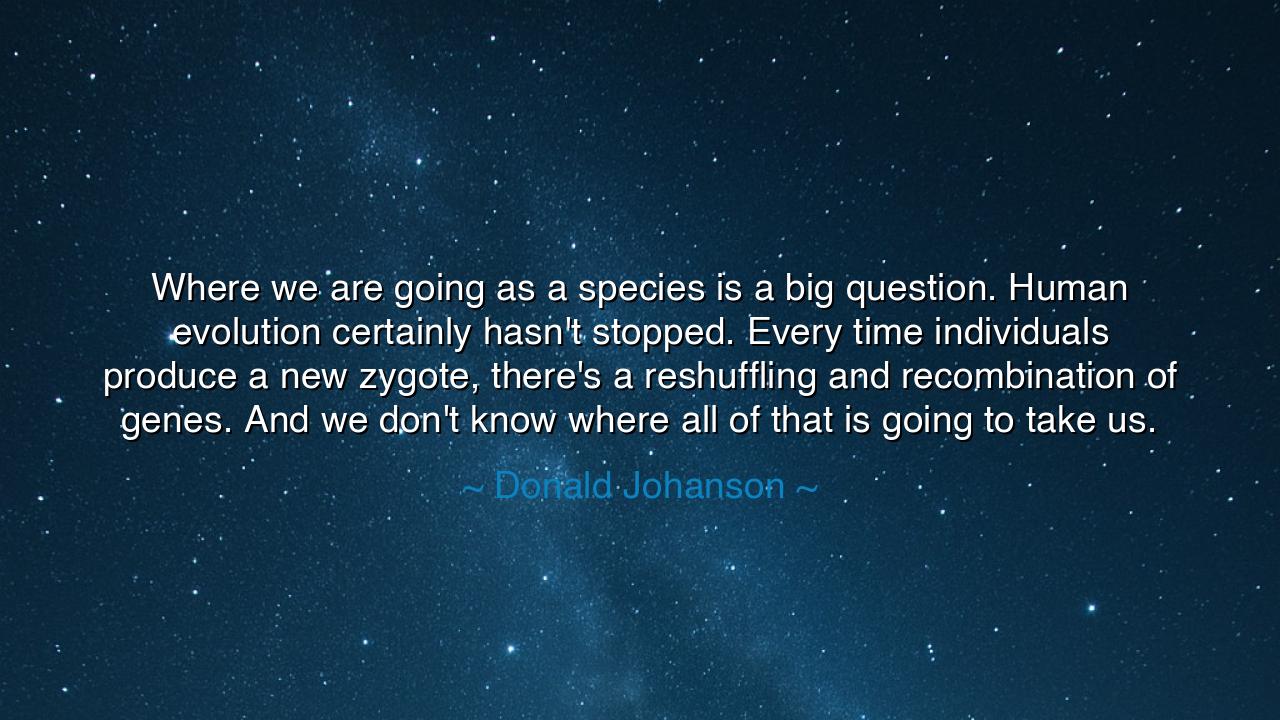
Where we are going as a species is a big question. Human
Where we are going as a species is a big question. Human evolution certainly hasn't stopped. Every time individuals produce a new zygote, there's a reshuffling and recombination of genes. And we don't know where all of that is going to take us.






Donald Johanson, the discoverer of the ancient skeleton Lucy and a seeker of humanity’s deepest roots, once spoke with awe and humility: “Where we are going as a species is a big question. Human evolution certainly hasn’t stopped. Every time individuals produce a new zygote, there’s a reshuffling and recombination of genes. And we don’t know where all of that is going to take us.” In these words lies not only the science of genetics but the poetry of destiny. He reminds us that the story of humanity is unfinished, that every birth is both an answer and a new question, that the path of our kind is written not in certainty, but in mystery.
The origin of this insight rests in Johanson’s life’s work: to uncover the bones of our ancestors and to read in them the tale of our becoming. From the plains of Africa where he unearthed Lucy, he came to understand that human beings are not fixed but ever-changing, shaped by forces of nature, chance, and choice. When he speaks of zygotes and recombination, he is not merely describing biology—he is pointing to the endless creativity of life itself. Each child is a new beginning, each generation a new experiment, each birth a new possibility.
To say that evolution hasn’t stopped is to remind us that we are not the pinnacle of creation, but wanderers still on the path. Just as the ape became man, so man may yet become something greater, or stranger, or nobler, or perhaps more perilous. The future is not set. It unfolds with every union, every child, every reshuffling of the hidden codes within our flesh. We walk forward blind to our ultimate form, yet knowing that we are moving, changing, becoming.
History gives us examples of this unfolding mystery. Consider the Black Death in the 14th century, which ravaged Europe, cutting down millions. Yet even in that devastation, human evolution pressed forward. Some who survived carried genetic mutations that gave them greater resistance to disease, mutations that live on in us today. In tragedy, new strength was born. Humanity was reshaped, not by its own design, but by the relentless hand of nature. This is Johanson’s truth: we do not yet know where evolution will take us, but we are carried forward by forces vast and unseen.
And yet, this truth does not lead us to despair but to humility. For every man and woman is not merely a life lived in isolation but a link in the vast chain of becoming. Each generation passes to the next the keys of possibility, reshuffling the deck of existence. To live, then, is to participate in the great unfolding, to add one’s thread to the tapestry of the future. This knowledge should make us careful, for though we cannot predict the end, we can shape the conditions in which our children will live, grow, and evolve.
The lesson is clear: walk with reverence into the unknown. Do not imagine that humanity has reached its final state, nor that our struggles and triumphs are the end of the story. Instead, see yourself as both descendant and ancestor: descendant of countless generations who shaped you with their struggles, ancestor of countless generations who will inherit the world you leave behind. To act carelessly now is to cast stones into the river of time whose ripples will touch shores you will never see.
Practically, this means living with responsibility. Care for the earth, for it is the cradle of future generations. Nurture knowledge, for it will arm them in struggles yet unknown. Practice compassion, for it will teach them to endure not only as individuals, but as a species bound together. Every choice you make—how you treat the planet, how you treat one another—enters into the great reshuffling of tomorrow.
So let Johanson’s words ring within us: “Where we are going as a species is a big question… And we don’t know where all of that is going to take us.” Let them humble us, inspire us, and remind us that the future is not yet written. We are travelers still, and the road stretches far beyond the horizon. Walk it with courage, with care, and with wonder—for though we do not know our destination, we are together in the journey of becoming.






AAdministratorAdministrator
Welcome, honored guests. Please leave a comment, we will respond soon